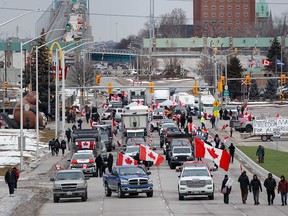Windsor mayor, deputy police chief to testify at Emergencies Act inquiry

Article content
There will be Windsor voices in the upcoming hearings on whether it was necessary for the federal government to invoke the Emergencies Act to deal with the so-called Freedom Convoy protests earlier this year.
On Tuesday, the Public Order Emergency Commission released a list of 65 people who the commission anticipates will be called upon as witnesses in the inquiry.
Among those the commission wishes to hear from: Windsor Mayor Drew Dilkens, and Acting Deputy Chief Jason Crowley of the Windsor Police Service.
Commissioner Paul Rouleau said the hearings are the public phase of the process of “finding answers to the questions assigned to (the commission) by Parliament under the Emergencies Act.”
“This critical phase will shed light on the events that led to the declaration of the public order emergency and fully explore the reasons advanced for the declaration.”
The list of witnesses includes protesters, law enforcement representatives, officials from all three levels of government (federal, provincial, and municipal), and representatives of businesses and organizations impacted by the protests.

Hearings are set to begin this Thursday and require in-person attendance of witnesses.
Dilkens told the Star he will be in Ottawa on Nov. 7 — and he’s not surprised to be called upon to give testimony.
“The Emergencies Act … is such extraordinary, powerful legislation, the need for an inquiry is built into the process,” he said. “I’ll answer whatever questions are asked of me.”
“It’s a fact-finding mission, and I’ll certainly be happy to speak to the facts as I knew them at the time.”
Dilkens noted that the City of Windsor declared its own State of Emergency in response to the protest occupation of Huron Church Road that blocked access to the Ambassador Bridge from Feb. 8 to 13.
“This was a national economic emergency playing out on municipal roadways,” Dilkens said.
“I think it speaks to the nature of what was going on around our country. Clearly, Ottawa was the main focus of that. But Windsor, Sarnia — many locations across the country were impacted by the same types of demonstrations.”
“From my perspective, I was almost daily in touch with the federal government, including the prime minister and the minister of public safety.”

The Government of Canada declared a public order emergency on Feb. 14 in response to the prolonged occupation of part of downtown Ottawa by Freedom Convoy protesters.
The establishment of the Public Order Emergency Commission and its independent public inquiry are required by the Emergencies Act.
The commission’s mandate is to “examine and assess the basis” for the declaration of the public order emergency, as well as examine “the appropriateness and effectiveness of the measures selected … to deal with the then-existing situation.”
The commission, whose hearing is expected to last six weeks, must submit its findings to the federal government by Feb. 6, 2023.
Rouleau said: “I am confident that, with the cooperation of all of the parties, the hearings will provide a fair and thorough process for the presentation of the evidence required for the Commission to be able to give the public the answers to which it is entitled.”

On the subject of whether the federal government will provide any help with the City of Windsor’s $5.3 million in extra policing costs to deal with the Ambassador Bridge blockade, Dilkens said he has received no word.
“No update. But I can tell you, this particular requirement of having the inquiry only increases the cost (to the City of Windsor), because there is now legal counsel involved for all of the participants,” Dilkens said.
“We have no line of sight yet with respect to that $5.3 million deficit we incurred, but we’re going to continue to pursue both federal and provincial support — because this was not a typical municipal policing operation.”









Postmedia is committed to maintaining a lively but civil forum for discussion. Please keep comments relevant and respectful. Comments may take up to an hour to appear on the site. You will receive an email if there is a reply to your comment, an update to a thread you follow or if a user you follow comments. Visit our Community Guidelines for more information.